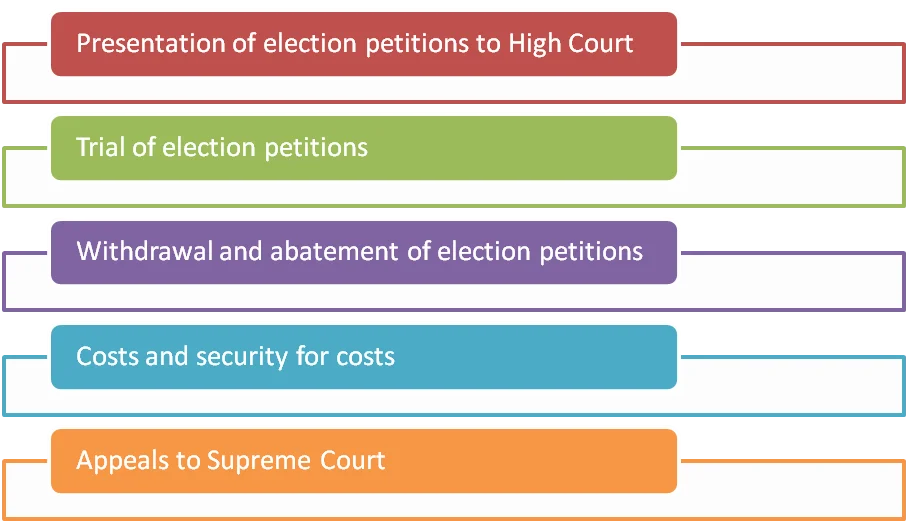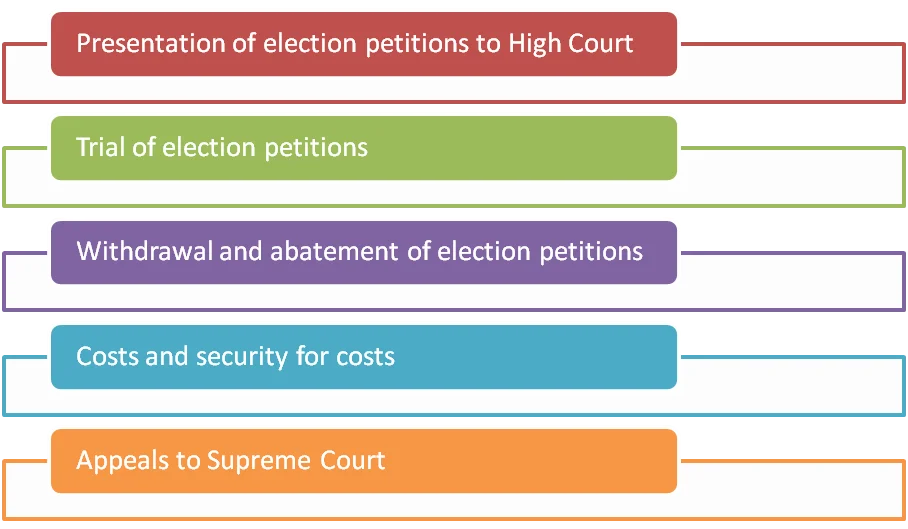The Representation of the People Act, 1950 and 1951 are fundamental laws governing elections in India. The 1950 Act focuses on the allocation of seats, delimitation of constituencies, and voter qualifications. Meanwhile, the 1951 Act addresses the conduct of elections, membership criteria, election offences, and the registration of political parties. Together, these acts ensure a structured and fair electoral process in the country.
Enroll now for UPSC Online Course
Overview of the Representation of the People Acts, 1950 and 1951: Key Provisions and Related Election Rules
Representation of the People Act, 1950
- This act provides for the allocation of seats and for the delimitation of constituencies for conducting election to the House of the People and the Legislatures of States, it makes the qualifications of voters at such elections and the preparation of electoral rolls.
The Key Provisions of the Representation of the People Act (RPA), 1950 are
- Allocation of Seats and Delimitation of Constituencies: It provides for the allocation of seats in, and the delimitation of constituencies for the purpose of elections to, the House of the People and the Legislatures of States, the qualifications of voters at such elections, the preparation of electoral rolls, the manner of filling seats in the Council of States to be filled by representatives of Union territories, and matters connected therewith.
- Procedures for Delimitation and Seat Allocation: It lays down the procedures for delimitation of constituencies and allocation of seats in the Parliament and state legislatures on the basis of population as per census figures.
- Presidential Powers in Constituency Delimitation: It also empowers the President of India to amend orders delimiting constituencies after consulting the Election Commission of India.
- Voter Qualifications: It lays down the qualification of voters as being a permanent resident of India, not less than 18 years of age, and not otherwise disqualified under the Constitution or any law made by the appropriate legislature on the ground of non-residence, unsoundness of mind, crime or corrupt or illegal practice.
- Preparation of Electoral Rolls: It lays down the procedure for the preparation of electoral rolls for parliamentary, assembly and council constituencies by appointing electoral officers such as the Chief Electoral Officer (CEO), the District Election Officer (DEO), and the Electoral Registration Officer (ERO).
- The ERO is responsible for the preparation of the electoral roll for each constituency, while the CEO and the DEO work under the overall superintendence and control of the ECI.
- Reservation of Seats for Scheduled Castes and Scheduled Tribes: It provides for the reservation of seats for Scheduled Castes and Scheduled Tribes in the Lok Sabha and the state legislative assemblies, and empowers the ECI to determine the constituencies to be reserved for scheduled tribes in the states of Meghalaya, Mizoram, Nagaland and Tripura.
Some of the relevant sections of the RPA 1950 are
| Section 3: Allocation of seats in the House of the People
Section 4: Total number of seats in the Legislative Assemblies Section 5: Allocation of seats in the Legislative Councils Section 6: Delimitation of parliamentary and assembly constituencies Section 15: Preparation and revision of electoral rolls Section 16: Disqualifications for registration in an electoral roll Section 20: Meaning of “ordinarily resident” Section 29: Reservation of seats for Scheduled Castes and Scheduled Tribes Section 30: Power of the Election Commission to maintain delimitation orders up-to-date Section 36: Bar of jurisdiction of courts |
Representation of the People Act, 1951
The Representation of the People Act, 1950 did not have all the provisions related to elections.
- The provisions for conducting elections to the Houses of Parliament and to the House or Houses of the Legislature of each State, the qualifications and disqualifications for the membership of these Houses, the corrupt practices and other election offences, and the decision of election disputes were all left to be made in a subsequent measure.
- In order to provide for these provisions, the Representation of the People Act, 1951 was enacted.
-
Parliament has also enacted the Representation of People Act 1951 dealing with:-
-
- Administrative machinery dealing with elections
- Election offences
- Election Disputes
- Bye-elections
- Registration of Political Parties
The Key Provisions of the RPA, 1951 Regarding Electoral Matters
- Criteria for Membership: Qualifications and disqualifications for membership of Parliament and State Legislatures.
- Powers of Election Commission in connection with inquiries as to disqualifications of members.
- Disqualifications: Few provisions related to disqualification in the Representation of People Act,1951 are as Conviction of certain offences (Section8), Undischarged solvent (Section 10), unsoundness of mind (Section 10A)
- Registration and recognition of Parties: It registers every party and after every election results it identifies and declares the parties as national party, state party or unrecognised -registered party.
- Facilities: Free supply of certain materials to candidates of recognised political parties.
-
- Checks and balances-It handles regarding disputes regarding elections and also checks the corrupt practices and electoral offences
- Powers of the ECI regarding enquiries as to disqualification of members.
-
- Facility provision: It provides Administrative machinery to conduct the elections alongwith free supply of certain material to candidates of recognised political parties
- Fulfilling Vacancies: Bye-elections and time limit for filling vacancies.
- Barring the jurisdiction of civil courts.
The Key Provisions of the RPA, 1951 Regarding Election Disputes

Other Acts Relating To Elections

Rules related to elections
-
- Registration of electors Rules, 1960:This rule helps to prepare and publish electoral rolls.
- Conduct of Elections Rules, 1961: It facilitates free and fair conduct of elections for the Parliament and State Legislatures.
- Prohibition of Simultaneous Membership Rules, 1950
-
- Members of Lok Sabha (Disqualification on Ground of Defection) Rules, 1985: These rules are framed for the Lok Sabha Speaker to give effect to the provisions of the Tenth Schedule which came into force in 1986.
- Members of Rajya Sabha (Disqualification on Ground of Defection) Rules, 1985: These rules are framed for the Chairman of the Rajya Sabha for giving effect to the provisions of the Tenth Schedule which came into force on 18 March 1986.
- Presidential and Vice-Presidential Elections Rules, 1974
- Members of Lok Sabha (Declaration of Assets and Liabilities) Rules, 2004.
- Members of Rajya Sabha (Declaration of Assets and Liabilities) Rules, 2004.
Enroll now for UPSC Online Course
| Must Read | |
| Current Affairs | Editorial Analysis |
| Upsc Notes | Upsc Blogs |
| NCERT Notes | Free Main Answer Writing |
Conclusion
RPA acts form the backbone of India’s electoral framework, promoting transparency and accountability in the democratic process.
- They empower the Election Commission to oversee elections and ensure adherence to the rules.
- By establishing clear qualifications and procedures, the acts contribute to free and fair elections, strengthening India’s democracy and the rights of its citizens.
Sign up for the PWOnlyIAS Online Course by Physics Wallah and start your journey to IAS success today!
| Related Articles | |
| Representation of the People Act 1951, Key Features, Important Sections | State Legislatures in India |
| Election Commission of India | Membership of Parliament in India |

 GS Foundation
GS Foundation Optional Course
Optional Course Combo Courses
Combo Courses Degree Program
Degree Program









